The Trader Who Wouldn’t Give Up
For this week’s Big Saturday
Interview, I’m pleased to welcome Fred Sawyer. Fred began trading in the
late-90s and, after a period of trial and error, became a successful part-time
swing trader. In this interview, Fred candidly shares the difficulties he faced
when he began trading and how he was eventually able to overcome them through
the use of systematic trading methods.
Eddie: Hi Fred, thank
you for joining us today.
Fred: I’m glad to be here.
Eddie: Fred, let’s start
off by finding out about your background. How did you get involved in trading?
Fred: Years ago, I was making good
money and I was looking for a place to put it and I had read an article by
George Gilder where if you had bought Intel
stock in 1981 and had put $10,000 in, it would be worth something near $20
million. I thought to myself, my goodness, you can talk about buying houses or
investing in mutual funds, but there is no vehicle out there that can produce
that type of return,’ so he had sent out these letters which talked about the
next Intel and the next phase of technology. Of course that is in the 1999 era
where the Internet boom was starting to happen. So I thought this was great
because I could just buy these stocks and in 10-15 years, or maybe even a lot
sooner than that, I would be extremely well off.
Eddie: You talked
about doing quite well with your work. What was your professional background?
Fred: My professional background was engineering. I was working as
an electronics application engineer but I am a customer interface person. So in
other words, I make sure the customer’s questions about technology get answered.
I will go out and talk to them about technology developments and try to take
some of their feedback on whether or not they can use it, and work with some of
our factory people to make sure our development is consistent with our
customers.
Eddie: Prior to getting the the Gilder letter, had you had
any other experience in the financial markets?
Fred: None. I knew a little about mutual funds, but that was about
it.
“…I lost about 90% of
everything that I had…”
Eddie: What was
the next step that you took?
Fred: Well what happened was I basically bought that all the stocks
that Gilder recommended, and even paid the
premium price for them.
I lost about 90% of everything that I had. I was so
distraught that I would go through and read stories on how people were making
money in the stock market when stocks would tank. I knew this was a zero sum
game, so when someone makes money, someone else is losing that money. So what I
said is, I need to understand how these markets work because I have to make this
money back. It was very depressing for quite some time. I looked for different
ways and read a lot of different books, and listened to radio programs and
stuff. I started to see that there were some methods that people had to
recognize how the market moves.
So after a couple years of not doing anything, I
saved my money and got back into trading in the market back in 2003. So I had
been away for a couple of years because I was very afraid to buy anything. I
started trading with price volume and Fibonacci type methods. Of course,
everything was coming off the bottom so I ended up doing very well.
Unfortunately, what ended up happening was I tripled the value of my account in
9 months, and then I thought to myself that I know what I am doing, so I started
to get more aggressive. I started to up the ante and traded options. I basically
gave back all the money I had made and then some. It was quite a lesson. What
had worked for me for that period all of a sudden stopped working. So again I
was discouraged and frustrated. This made me realize that I needed to expand and
look at other methods and other ways of doing things to become successful. So
what I noticed all of last year was that the market was very choppy. So most
stocks would go up a couple points and then right back down again. I got very
discouraged because I found it hard to make money and was very far from
recouping what I had in 2003. But what I noticed was that buying and selling to
capture a trend was very difficult to do. What I needed to do was get certain
portions of the move. You need to be able to have a statistical measure of your
trade, so you know what percentage of the time it will be successful and what
percentage of the time you won’t be.
Eddie: So my guess is that you started to think
like an engineer. You looked at the market and turned it into something you knew
by finding a quantitative formula for success. Is that accurate to say?
Fred: Yes, I wanted something that wasn’t just me buying and
selling a stock on feel. I wanted a definitive reason for why I bought and sold.
Eddie: Do you happen to remember some of the stocks
you had purchased from that Gilder
newsletter?
Fred: I do indeed. They were JDS Uniphase, Qualcomm, and Global
Crossing. Global Crossing was his biggest recommendation. I followed that one
specifically and I just lost it every time I saw what it did.
Eddie: In 2003, when you had made back some
of your money, what stocks were you buying and what methodology did you use to
buy them?
Fred: I was buying a lot of gold and silver equities. I used price
and volume. In other words, I looked at where volume was in particular swing
points, volume at certain resistance levels, and Fibonacci levels. I learned
that Tom O’Brien has a syndicated show on the airwaves. He had put together the
method that I was using.
Eddie: Going forward just a little more, what
specific options did you buy that again caused you to lose everything?
Fred: Well I had a lot of success trading AngloGold options. I said
this time I am going to really rake it in. This was when gold was near $400 an
ounce and these companies had earnings coming up in January. I expected them to
be spectacular because in the latter part of 2003, gold was trading over $400 an
ounce. I figured I would capture the ride for these great earnings reports. I
was in for a pretty big rude awakening because even though the earnings were
spectacular, the mining stocks sold off. I was totally surprised. Now knowing
what I know, I would have done a lot more with the options. One aspect of
trading that I have learned is that things that make me successful on my day
time job, things like getting down and getting your hands dirty, and pushing
forward with a goal in mind, without any consideration to failure, was not
working.
As I had my drawdowns in my account I told myself I would stay the
course and roll my options out and hang in there until the storm passes. Well,
the storm didn’t pass and I got slammed pretty good. One aspect of trading that
I have learned is to separate and remove those qualities which make me
successful in my daytime job and even my personal life. I am trading on a whole
different set of attributes. Most people, when they have a job, get complacent
and they stagnate. I have always been the type of person to push myself to the
next level because that is how you grow. In trading you have to be very careful
how you do that, because if you have a great month, the formula for upping your
account may not be to go ahead and trade more, it may be to just pull the money
off on the sidelines and wait for the next opportunity. This is something in my
personal life I am not accustomed to doing. You work and you do everything you
can every minute of the day to be productive. The emotional attributes of
trading are things I am learning from experiencing them through my trades and
not from past experiences in my life.
Eddie: Going back to that turning point that you
had, tell me about how you evolved from that.
Fred: Well I really wasn’t looking for trading systems. I had
gotten a call from a guy from TradingMarkets about a book. It was called
How Markets Really Work by Larry Connors. And I looked at it but it didn’t tell me
anything about how to apply these statistics it taught me. I had gotten a call
from someone about trading systems but I really wasn’t interested. Last year,
when I started to struggle again and I was going through drawdowns, I got a call
from Rob Loscialpo at TradingMarkets and he was telling me about these systems.
I asked him how he sets stops, and he said there are no stops. So he told me it
was
4 systems for $1000 and I thought about how people always talk about systems
and how they never work. However, Rob was so confident and calm every time I
threw a question at him that I thought he might have something here. Rather than
lose a $1000 on a series of bad trades, I might as well go out and buy these
systems.
“…I thought it was
spectacular because I started to see the account go up…”
Eddie: At any point prior to your deciding to take
that plunge, did you ever think about giving up on trading entirely?
Fred: At the end of every day I would feel like it, but a part of
me would always tell me that I am not a quitter. It’s a good thing and a bad
thing. I will stick around for the success, but if a stock goes against you, you
say tell yourself that you are going to hang in there for this stock and not get
out, or sell this thing at a loss to see it go back up again and give up huge
gains.
Eddie: So you were talking to Rob and what happened
next?
Fred: Well, I ordered some systems: The ETF Sweet Spot Method, %B
Trading System,
Options Income Stream, and
RSI 25. I looked at some of them and told myself that if I had more money I
could probably trade some of these things, but I told myself I was going to try
it anyway. I tried a couple with the Bollinger Band system and a few of them I
got hit pretty good on. I was starting to really question if these things work,
so I started back-testing and saw, in fact, that they did work, but there
were some instances where you do get creamed. I realized I just needed to
lighten up on the position size. I think soon after in March, he contacted me
about the Swing Trading College, and he said they it was nothing like this. I
told him I really needed something and so he signed me up and I did it. It was
one of the best experiences I ever had.
Eddie: Tell me about your experiences and how it
turned things around for you.
Fred: As soon as I finished the class I started putting on some
small positions. The first few days went against me and I thought to myself ‘I
can’t catch a break.’ But I had faith in the system, and I saw the statistics
and I knew at some point this was going to work. Wouldn’t you know it, a couple
of days later the market turned, and I had some good profits on a couple of
trades. I thought it was spectacular because I started to see the account go up,
and of course I then started to feel more confident. Even when I saw the
drawdowns, I didn’t feel fazed. Sometimes I would make the mistake of having a
small profit in a stock and hanging around a little too long by cheating on the
system. In those situations, the trade would go
against me. So finally I made the rule that if the system gave the ‘out’ signal,
that’s it, I would be out because there is always another great trade behind it
and you want to have your money free and clear to take advantage of it.
Eddie: How did you relate that experience to your
professional career?
Fred: Well, the market is very different. You are dealing with a
strange phenomenon. In engineering, you are dealing with your customers, so you
need to be knowledgeable about your material. You also need to be honorable with
your co-workers and customers to help them gain success as well. It is very
different in the trading environment, where you are isolated and on your own.
The aspects of trading that I noticed when I initially got in was that if you
buy stocks and hold on to them long enough, you will have tremendous rewards.
But whoever thought that JDS Uniphase would be trading at $360 one day, would be
a dollar stock soon after? Especially considering they had billions of dollars
in the bank and a huge infrastructure. It wasn’t like they were misrepresenting
their earnings. They really had all the backing with the cash and the
technology. So things like that I had never conceived of happening. That type of
thing had no logical basis for it.
Eddie: Is it safe to say that you have finally
experienced some success as a trader?
Fred: What I need to learn to do is control that aspect of my personality
that when I have a huge run-up in my account, to be able to take it off the
table. When you have a couple of good trades you think you can do anything and
when the stock turns against you, you end up right back down to where you were
before. I am learning that as I get the account to a certain level, it’s not
about how effective you are, but how well you manage your risk.
A situation where I really came to
know this was when I was in the options trading class. Joe Corona is a guy who
has been trading for years and I watched him get his brains beaten in by some
trades. Some even that I would not get involved in with my own knowledge. He
would take the trade and I saw a lot of trades that he did that I wouldn’t have
done, but his account was still up significantly, even with the unpleasant
surprises. Why? Because he effectively managed the account. If you have a system
where you have a high probability of success you want to make sure to allocate
the money properly, and scale in and to have cash in those situations where the
market pulls in dramatically.
Eddie: What kind of specific rules have you set for
yourself?
Fred: I am still working on that. I guess what I am doing right now
is this: let’s suppose I have a stock that I am trading and it meets the RSI 5
method. I ask myself ‘what is the most amount of money I would accept as a
drawdown for this?’ What I will do
eventually is to stick to a flat amount and try to build a surplus. I will then
trade off a base amount but have a surplus which will allow me to add to trades
accordingly in unusually good conditions.
“…If I had held on a
little longer, the $12,000 that I put into the trade would have been about
$90,000 just 4 months later…”
Eddie: Do you still struggle with second-guessing
yourself?
Fred: Not so much anymore. As you get more experienced in your
trading, you realize that there are so many trades every day. And you see that
you cannot take part of them all unless you have unlimited capital. What I
realized is that when I have a profit, I know there is another trade behind this
one that I can get into. I’ve gotten so many methods from TradingMarkets that
there is no reason to second guess anymore because there is no reason to hold on
to a particular trade when there are so many more opportunities I can get
involved in.
Eddie: How do you differentiate between a system
that is going to work, and one that is going to lose you money?
Fred: Well, I was fortunate because I only spent a small amount of
money for the initial systems that worked well for me. So when I looked at other
products that cost more, I was okay with it because I had seen the success with
the smaller systems.
Eddie: When you look back at approaches that you
have used in the past, what makes the difference between what makes money and
what loses money?
Fred: I guess having the statistical measurement of what took
place. When I was trading the gold stocks, a friend of mine helped me understand
why it did not work. There were only certain cases where it would work, and I
did not take them into consideration. I learned that you have to look back over
time because some things that work today didn’t work in the past and won’t work
in the future. In other words, there is a sampling process and it needs to be
over a long period. Because over a 10-15 year period the numbers that are being
reported are correct and accurate, but we just might not see a big run for a
while. There are times where you can make your system fit your case, but when
you run the numbers by statistics alone, it makes it a lot harder to manipulate
the results
Eddie: As you mentioned earlier, you are an
engineer by day. How do you juggle your engineering career and your trading
activities?
Fred: Well it depends. I have some flexibility, but what I try to
do is put my positions on in the morning, just before I start my daily job. So I
have those there and between 9 -10:30 I check to make sure the sell orders got
hit. I just check to make sure everything is okay because I don’t have too much
time to really focus on that throughout the day. With TradingMarkets, since you
don’t have to be in front of our computer all the time, it makes it a lot
easier. I know the probability and I know what is going to happen, so all I have
to do is make sure that I manage the bad end of the tail. As Larry Connors says,
you can have a lot of good trades, but that small portion of trades that are
pretty bad can really drag you down. So for me, I try to make sure I have the
appropriate position size to take care of it.
Eddie: Are there any memorable trades that you can
tell us about?
Fred: Yes, actually there was a trade I did with the ETF Swing Spot System
from TradingMarkets.
Back in May I bought OIH calls and I also did a bullish put spread on it. I got
out and made $2000 within a couple of days. If I had held on a little longer,
the $12,000 that I put into the trade would have been about $90,000 just 4
months later.
Eddie: Nice.
Fred: You know what don’t I give you few
more trades that you can simply insert into this interview. That okay?
Eddie: Sure.
Editor’s
note: The following series of trades were sent for inclusion in this interview.
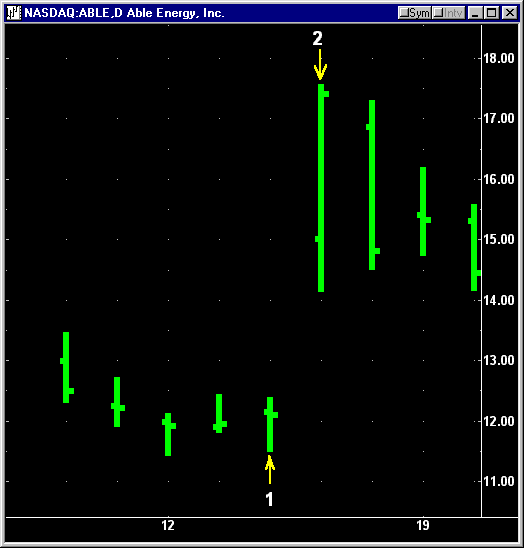 |
| In this trade on ABLE, I applied TradingMarkets R4 Method, but I used some discretion on the entry.
|
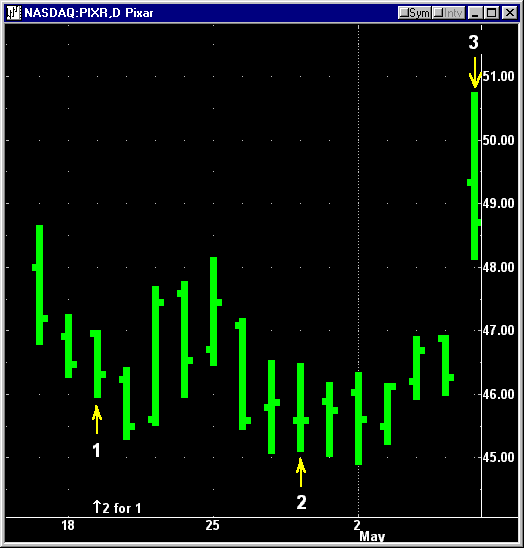 |
| This was an interesting trade trade in PIXR. As you can see, the buy signals occurred in late April. At the same time, I know earnings were due on May 6. I knew that there was an edge to this trade that I could exploit. In addition, I used a combination of the R4 Method (for the entry) and the 20/30/40 Method (for the exit).
|
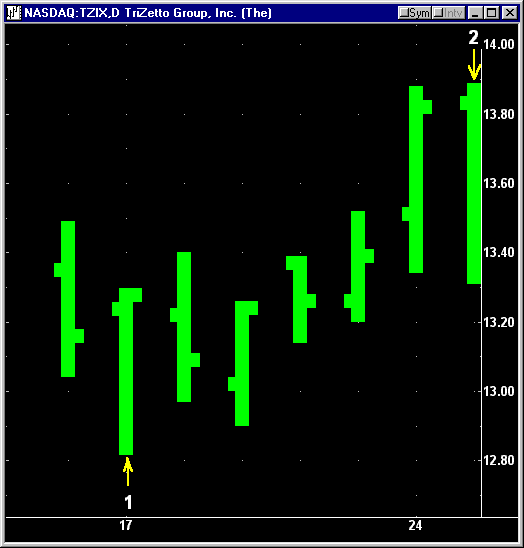 |
| On this trade, I used the 20/30/40 Method for both the entry and exit. It was a pretty straightforward trade.
|
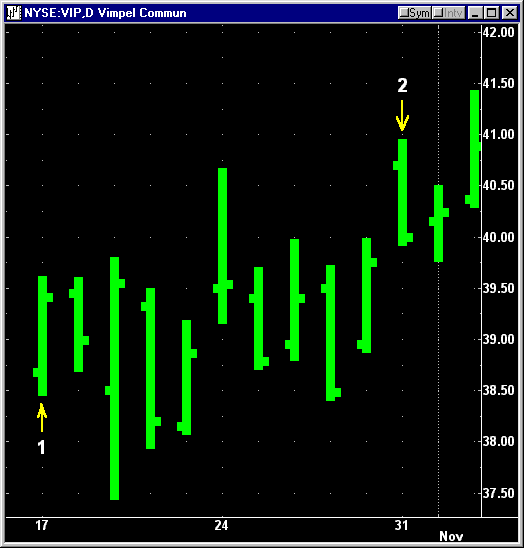 |
| Here’s an R5 trade. but I used discretion on this one.
|
Eddie: If a trader were just starting out or was
going through a rough period, what advice would you give them on how to win in
this game?
Fred: Well, the best thing you can do is to protect your capital. I
have heard a lot of people say it, but I never took it to heart thinking if I
worked long enough and hard enough I would come out on top. But the most
important thing is to guard your capital. I have gotten beat up enough times to
know that if I were more strict about that rule I would be in a lot better
position today. I would always say to not look for the home run. You really grow
your account by getting small returns on multiple trades. I tell people to take
a step back and go slow, and to manage their losses. Joe Corona on a $25,000
account in two weeks time turned it into $29,000. So you figure by effectively
managing his trades, that’s $8000 a month. On a $25,000 account, that is pretty
good. And it comes from more effective risk management. Unlike in my profession,
you create something and see it work because you created it. However, in trading
you can’t do that. If you take a position and it goes against you, you tend to
want to hold it until it works for you, but the market isn’t going to give that
to you–it really isn’t in your hands like with other parts of your life.
Eddie:
Which trader has inspired you the most?
Fred:
Without question, Basil Chapman the inventor of the Chapman Wave a proprietary
technique that he developed over 3 decades. Basil spent a lot of additional time
to help me through a very difficult time and helped me restructure and rebuild
my trading analysis method and my psychological approach to trading. He kept me
going and was always there for me. He also introduced me to Larry Connors. As
far as traders that I admire from a historical perspective, I’d have to say WD
Gann.
Eddie: What are your own personal goals as a
trader?
Fred: Well I would like my trading account to look like the equity
curve on TradingMarkets
Raptor System. In the end, that is what the
goal is.
Eddie: Have you set any particular financial goals
for yourself as a trader?
Fred: I got into trading because we are in difficult times
economically. We have a huge debt and jobs are downsizing. Some day I might not
have my position with my company anymore because I was replaced by someone
cheaper. I have told myself that I need to take every step possible to prevent
this from happening. I can go into another business and open a shop, but the
reality is that you still have employees and overhead costs. And if there aren’t
any customers that walk through your door, then you will not generate any money.
However, in a market there is always a buyer and always a seller. If the market
goes up, down, or sideways, you make money. That is one of the reasons why I am
passionate about this. Another reason is because I have had my money in 401(k)s
for years, and I contribute the maximum but I am nowhere near a safe retirement
because the returns that these funds have gotten is nonexistent. Not only am I
going to have to provide for myself if something were to happen with the job
market, but I am also going to have to provide for my retirement account. How am
I going to do that? Well, I would have to do that myself with the skills I got
from TradingMarkets.
Eddie: Fred,
I’d like to thank you for joining us today.
Fred: Thanks for inviting me.
It was an honor.
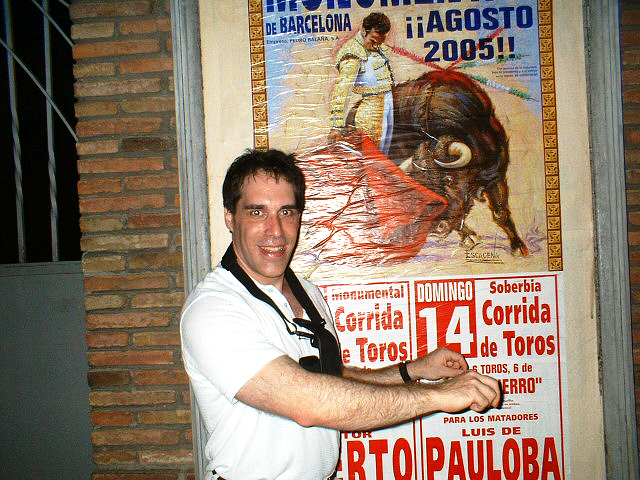
Fred Sawyer
Editor’s note:
Please free to share your thoughts with me about about this interview. Email me
at eddiek@tradingmarkets.com.
Eddie Kwong
Editor-in-Chief
TradingMarkets.com
